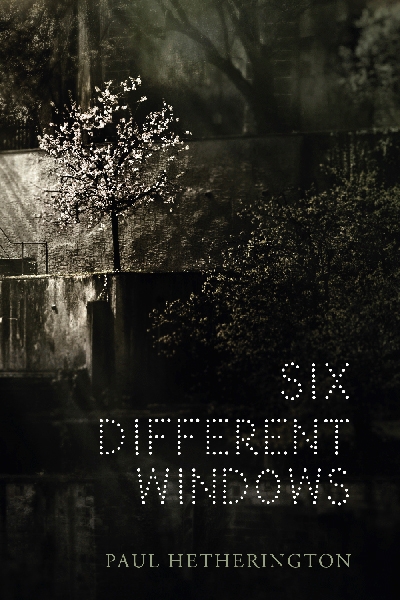 Seen through one window, Paul Hetherington’s Six Different Windows appears to be a collection of poems concerned with the death of art. Such a theme is perhaps not surprising given that Hetherington, in addition to his seven books of poems, edited three volumes of Donald Friend’s diaries for the National Library of Australia, the last of which was shortlisted for a Manning Clark House National Cultural Award in 2006.
Seen through one window, Paul Hetherington’s Six Different Windows appears to be a collection of poems concerned with the death of art. Such a theme is perhaps not surprising given that Hetherington, in addition to his seven books of poems, edited three volumes of Donald Friend’s diaries for the National Library of Australia, the last of which was shortlisted for a Manning Clark House National Cultural Award in 2006.
Creativity and its decline consume the collection. In a poem entitled ‘An Ageing Artist Reviews His Work’, a painter sets fire to two years of work; in ‘Artist’ – a poem that might, for its biographical correspondents, be about Friend – an irascible painter refines his style until he cannot write his name. In ‘London’, sculptures and paintings fill ‘every corner of seeing’ yet the speaker is gripped not by a celebration of form but a recognition of its lack: ‘We existed in a space that was skewed,’ he confesses, ‘disrupted, disowned, ill-conceived.’
The human form in its architectural glory is a frequent study in Six Different Windows. But just as frequently bodies find themselves at odds with the minds they house. In a love poem called ‘Holding’, a man grips a woman – her back arched, her head thrown back – as she falls away from him. ‘Time has no dimension’, he learns, beyond ‘the running steps of her rib cage’. In this unstructured moment, he has become ‘alien to himself’.
More than surfaces Hetherington’s poems prefer a view of the body’s interiors: ‘The blood was always there,’ a speaker observes in a poem that ruminates on childhood wounds and the mystery of girls’ menstruation. He considers his own body – ‘little more than a container / for the litres of blood’ – and marvels at ‘the body releasing itself / in a hundred ways – as if always / wanting to let go of itself’.
Yet form and body offer only one view into the collection. Hetherington wrote his doctoral dissertation on the poetry of Emily Dickinson, and his poems clearly stand in a tradition that upholds a poetry of mind. Hetherington’s poems are more sensual than Dickinson’s and make greater use of narrative, but the similarities extend beyond a passion for the em-dash. Both Dickinson and Hetherington are interested in the mental construct of ‘space’ more than the physical construct of ‘place’. And both take pleasure in a mind in disarray: the disjunctions of aporia provide the necessary kick to throw their poems into being.
For Hetherington, at least in his poems, the pleasures of aporia seem peculiarly female. While his male subjects are often alienated from their bodies and bemused by the loss of their generative powers, his female subjects are invigorated by emptiness, chaos, disobedience, and other improprieties. For them, the mind’s perceptions and processes are not to be controlled but played like a game: ‘Is the past like this,’ a speaker asks, ‘something to step into / like an antique dress-up?’
Hetherington’s women are usually found in transit. In the poem ‘Passport’, a gypsy on a train to Switzerland strips down to her ‘bra and colourful knickers’ in a moment of seeming madness. She remains silent and unperturbed by the passengers’ stares as guards wrap her in a blanket and escort her from the train. She has escaped, the speaker thinks admiringly, the ‘confined space called right behaviour / that we had entered and agreed to share’. In ‘Through A Window, Looking Back’, another woman watches the Italian countryside recede as her train speeds toward her lover. Her pleasure is not a simple sense of freedom from family and domestic routine, but a sensation of vertigo – ‘the stomach dropping into space / on a steep climb’ – that hits when she remembers:
how once they’d been at loggerheads
for two days, and on the third, had made love
and barely known each other
or themselves. She’d wanted to keep that –
the not-knowing, the animal life
that had risen. She had wanted
to stay strange to herself.
The collection concludes with a portrait of a woman – perhaps the one from the train – who, having hidden herself for too long in an inadequate marriage, has arrived at a villa in another country: ‘She’s in a room not far from where the sea / breaks across the rocks, loosening her blouse.’ Memories of her family dissolve into silence, and the absence of greeting delights her. The woman ‘handles her arms, strokes the skin / of her legs’ and ‘unpacks her heedlessness’.
Hetherington usually reserves this kind of reverie for female characters, with the exception, perhaps, of the beautiful poem ‘Dépaysement’, which pays homage, as the title suggests, to the generative powers of disorientation. Like many of the poems in Six Different Windows, it begins with a view of the world receding. But this time the speaker, it would seem, is male. The man is strolling down a street in Barcelona watching a church bell lurch on the horizon. A white dove batters a high pane of the old city’s cathedral. Inside, incense drifts like the snow until everything – the speaker’s body, the sky – is charged and ringing with the deepest of mysteries:
My body was tolled across time
as someone walked in my yard
tying back plants, puzzling at grace
under a clangorous sky.
♦
Review of Six Different Windows by Paul Hetherington. Originally published in Australian Book Review (Sept 2013).
